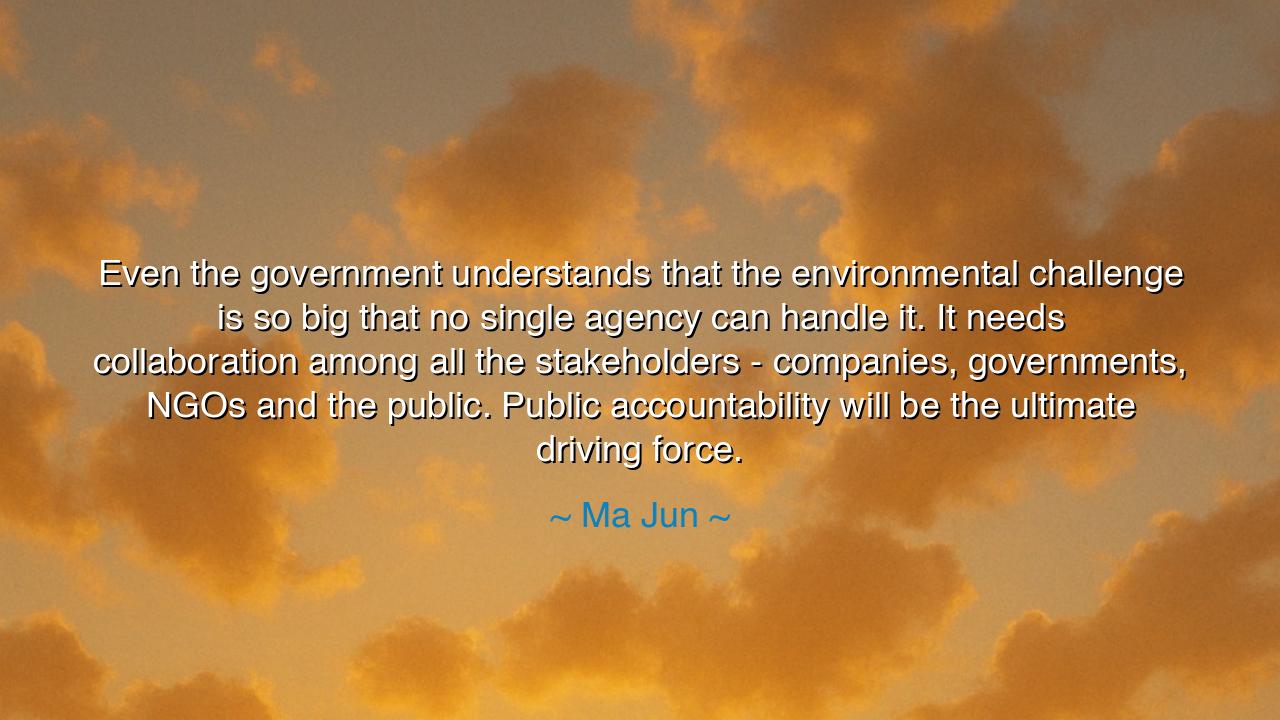
Even the government understands that the environmental challenge
Even the government understands that the environmental challenge is so big that no single agency can handle it. It needs collaboration among all the stakeholders - companies, governments, NGOs and the public. Public accountability will be the ultimate driving force.






The words of Ma Jun, one of China’s most courageous environmental voices, resound like a call from the mountains: “Even the government understands that the environmental challenge is so big that no single agency can handle it. It needs collaboration among all the stakeholders – companies, governments, NGOs, and the public. Public accountability will be the ultimate driving force.” In these words lies not only wisdom, but a vision of unity — a reminder that the world’s greatest battles are not won by rulers or heroes alone, but by the collective spirit of humanity. Ma speaks as one who has stood before the rising tide of pollution and seen that no one hand, no single throne or institution, can hold it back. Only when all hands reach together — the hand of the state, the hand of the people, the hand of the earth itself — can balance be restored.
The origin of this quote springs from Ma Jun’s own lifelong struggle against environmental degradation in China. A journalist turned activist, Ma witnessed the rapid industrial growth of his nation, a progress purchased at the cost of poisoned rivers, darkened skies, and forgotten villages. In 2006, he founded the Institute of Public and Environmental Affairs (IPE), creating one of the first public databases to expose pollution by corporations and industries. In doing so, he unveiled a truth long hidden: that the environment cannot be healed by silence, nor by decree — it can only be saved by transparency and collaboration. His words came from hard experience, for he saw that neither the government alone, nor the private sector, nor the people in isolation could solve the problem. All must work together, bound by accountability and moral courage.
In the style of the ancients, let us meditate upon his wisdom. The environmental challenge, as Ma calls it, is not a battle of one generation or one nation — it is a struggle that binds all life. The earth does not recognize our borders, our economies, or our titles; the air we breathe belongs to all, the water we drink flows through the veins of humanity itself. When rivers are poisoned in one land, their suffering ripples outward. When forests fall to fire and greed, the winds carry their ashes across the seas. Thus, no agency or government can face this alone, for nature answers not to authority, but to balance. The environment demands not command, but cooperation.
History offers a mirror to this truth. When the nations gathered in 1987 to sign the Montreal Protocol, they were not united by politics, but by necessity. Scientists had discovered that human industry had torn a wound in the sky — the ozone layer — exposing all life to deadly radiation. For once, humanity acted not as many nations, but as one species. Governments, corporations, and citizens came together to eliminate harmful chemicals, and through years of discipline and cooperation, the ozone began to heal. This stands as a testament to Ma Jun’s vision: that only through collaboration and accountability can the wounds we inflict upon our world be mended.
Yet Ma also warns of a truth deeper than policy — that public accountability is the ultimate force of change. Governments may pass laws, but without the eyes and hearts of the people, those laws become hollow. Corporations may promise reform, but without public vigilance, their words become ash. The power of the people — to question, to demand, to hold power to account — is the root of all lasting transformation. When citizens rise together, armed not with anger but with awareness, the earth begins to breathe again. The despot of pollution, like any tyrant, thrives in darkness; and accountability, like sunlight, is its undoing.
Still, the path is not easy. Many will say, “What can I do? I am but one person.” Yet this is the very illusion that has allowed destruction to flourish. Each drop of poison spilled into the sea was poured by a single hand; each spark of renewal begins likewise. The farmer who turns to sustainable methods, the company that chooses integrity over profit, the citizen who refuses to be silent — each adds strength to the chorus of the living. The earth does not ask for perfection, only for responsibility. And responsibility is born not from wealth or power, but from conscience.
So, my children of the future, hear the teaching of Ma Jun and take it into your hearts: no single force can save the world — only the unity of many hearts can. The government must act not as master, but as servant; the companies must see profit not as god, but as tool; the people must see themselves not as helpless, but as stewards. Be not spectators of the world’s suffering, but participants in its healing. Speak truth to those in power. Teach your children to cherish the soil and the sky. Support those who labor for the planet, not with fear, but with hope.
For as Ma Jun reminds us, collaboration and accountability are not merely strategies — they are sacred duties. The earth, patient and wounded, calls not for heroes but for harmony. Let every act of awareness, every choice of conscience, every voice raised for justice, be a seed sown in the soil of renewal. And when future generations walk beneath clearer skies, they will know that in our age of struggle, we remembered the oldest truth of all: that we rise or fall not as governments or companies, but as one people sharing one home — the earth itself.






AAdministratorAdministrator
Welcome, honored guests. Please leave a comment, we will respond soon